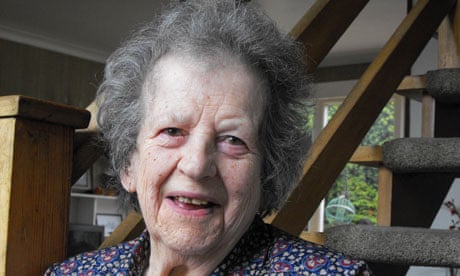Betty Jerman, who has died aged 88 of cancer, was known to generations of Guardian readers from the 1960s into the 21st century as the woman who three times a year filled several columns of the paper with an essential list of activities and entertainments to occupy children during the school holidays. But her fame will enduringly rest on the piece she wrote that led the women's page on 19 February 1960 under the headline Squeezed in Like Sardines in Suburbia. Like most of what she wrote, it was based on her own experience as a housewife, as wives and mothers were known in that distant decade, and led up to her peroration: "... this example of suburbia is an incredibly dull place to live in and I blame the women. They stay here all day. They set the tone. Many of them look back with regret to the days when they worked in an office ... I cannot help wondering what effect the mental atmosphere will have on our children."
Jerman had the enviable knack of setting off vivid correspondence from the readers; this one was a blazing rocket. One reader in particular, Maureen Nicol, wrote from Wirral of her own housebound despair and suggested: "Perhaps housebound wives with liberal interests and a desire to remain individuals could form a national register, so that whenever one moves, one can contact like-minded friends." The letters poured in, the National Housewives Register was born, and Nicol was made an OBE. In 1987 the housewives' register metamorphosed into the National Women's Register and has about 7,500 members nationally, with more branches and individual members around the world.
Jerman's father was an unemployed printer living in Harlesden, north-west London, during the depression. This is where Betty was born, but she must have had scant memories of it, as her mother juggled property deals and moved the family 13 times in Betty's first 14 years. Betty Wilson received a patchwork education at schools across London, from which she emerged into a job in the Peterborough office of a wartime emergency supplies depot. She then joined the Foreign Office in the political intelligence department, where she eventually edited a departmental newsletter about enemy movement and propaganda. After the war, in the German section, she provided the foreign secretary with a daily digest of media comment.
Soon she found her true vocation in the Fleet Street office of the Manchester Guardian. Initially she wrote female-interest articles, usually on fashion, covering the shows of Hardy Amies and Norman Hartnell. In 1953 she commented on the royal robes and regalia from a position among thousands of child spectators lining the coronation route. The following year she married Leslie Jerman, a Londoner working as a reporter on the Fleet Street news desk of the Scotsman. The transformation in her life and work was almost seamless, but not quite. Mary Stott arrived as women's page editor in 1957 and Jerman resumed production with a stream of freelance articles about her life as a wife and mother, and never stopped.
She wrote about bringing up her son, and in 1959, when she had her second child, a daughter, she wrote about what she had learned from the first experience. She decided she needed a daily nurse, a cleaner and a nappy service, and though she was advised that that kind of help was out of reach in the new post-war world, she found them: "The nurse charged 25s a day but, since she bathed and gave breakfast to my son, bathed the baby, changed the baby throughout the day, washed and ironed all the children's clothes, shopped and cooked lunch, got my son to rest and later took him for a walk while I slept, and returned to make me a cup of tea, prepare tea for the boy, get him to bed and prepare dinner for self and husband, this seems small payment."
There was no stopping her, and her readers loved it. She wrote about playschools and about the firms that designed adequate shoes for children's feet and those that didn't, and she wrote a book about dressmaking. In 1971, she wrote a series on Pauline Jones, a woman who in the midst of a desperate series of events in her life abducted a child and was sentenced to three years' imprisonment. Jerman's articles made Jones a cause celebre and prompted a Free Pauline Jones movement and questions in the Commons, but failed to gain Jones an early release. In 1981 Heinemann published Jerman's book The Lively-Minded Women, about the first 20 years of the National Housewives Register. Her three Guardian articles a year on holiday activities became a bestselling Pan paperback called Kids' Britain (1986).
Jerman's last years were hampered by macular degeneration, but she treated this as another challenge and started to disseminate information about talking books and newspapers. She survived Leslie by just under a year and is survived by her children Seth, Stacey and Toby, her grandchildren James, Hannah and Emily, and one great-grandchild, Reece.
